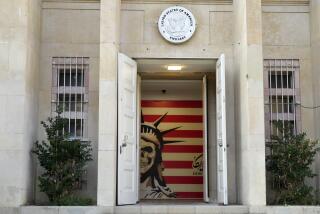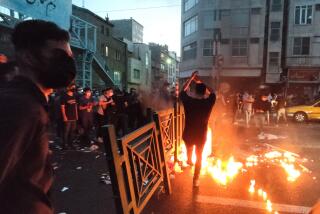CIA Saw Rebel Group Winning in Iran : Takeover Could Compound U.S. Problems, ’84 Memo Reported
- Share via
WASHINGTON — In December, 1984, the CIA’s covert-action chief concluded that a rebel organization with a history of anti-American agitation was likely to seize power in Iran after the death or downfall of the Ayatollah Ruhollah Khomeini, a result that could compound U.S. problems in the Middle East.
According to a CIA memo cited by the presidential commission headed by former Sen. John Tower (R-Tex.), the agency’s deputy director for operations considered the group, known as the Moujahedeen, “to be well organized, influenced by the Soviets and likely to succeed Khomeini.”
At the time, the U.S. government’s public position was that the Moujahedeen was only one of many Iranian opposition groups, none of which had much chance of overthrowing the Tehran government.
Since then, the organization has gained some credibility in the eyes of U.S. officials because it has survived in spite of a determined effort by Khomeini’s government to crush it. But State Department officials still think it has no more than a long-shot chance of taking power.
Policy Problems
The disagreement over the relative strength of the Moujahedeen dramatizes the difficulty that the U.S. government faces in formulating policy toward Tehran in the wake of the Iran- contras affair. If the organization has a realistic chance of taking power, Washington will have to modify its Iran policy to recognize the possibility of a Moujahedeen-led government.
And until some consensus emerges, officials agree, the organization merits close attention.
Unlike the situations in Nicaragua, Afghanistan and Angola, where the Reagan Administration is supporting anti-government rebels, Washington has not encouraged the Moujahedeen, which some officials consider even more hostile to U.S. interests than the Khomeini regime.
On July 25, 1985, Richard W. Murphy, the assistant secretary of state for the Near East, told a House subcommittee that the Moujahedeen “remains a militantly Islamic, anti-democratic, anti-American and anti-Western collectivist organization which continues to employ terrorism and violence as standard instruments of policy.” A State Department official said there has been no change in that assessment.
Although the Moujahedeen denies that it is anti-American or anti-Western, the State Department’s repeated denunciations of the organization would be sure to chill relations if the Moujahedeen does succeed in ousting Khomeini.
Viable Alternative
Ali Safavi, a Moujahedeen spokesman in Washington, pointed to the CIA assessment as evidence that the Moujahedeen has become the only viable alternative to the Khomeini regime. He said the group has become increasingly effective in its guerrilla attacks inside Iran, attacking power stations and other economic targets.
Also, the Moujahedeen operates a clandestine radio station on both AM and short-wave bands, and it even produces its own television program--a half-hour Persian-language broadcast on Iraqi television that can be picked up in many parts of Iran.
Safavi maintains that Murphy’s July 25, 1985, attack on the Moujahedeen did not necessarily represent the government’s true assessment of the organization but merely was part of the Administration’s effort--which also included arms sales--to improve relations with Tehran and win the release of U.S. hostages in Beirut.
In support of his argument, Safavi cites the Tower Commission report, which reprinted a letter, dated July 8, 1986, from the shadowy Iranian go-between in the arms sales, Manucher Ghorbanifar, to an unnamed Iranian contact.
In the letter, Ghorbanifar cites eight steps that Washington has taken to improve relations with Tehran. Step four is the issuance “of an official announcement terming the (Moujahedeen) terrorist and Marxist.”
Seen as Coincidence
Safavi argued that Murphy’s statement, issued only a month before the first U.S.-sanctioned Israeli shipment of arms to Iran, must have been an integral part of the program.
A State Department official said, however, that the timing of Murphy’s statement was a pure coincidence and that it was a sincere expression of the department’s view of the group.
The State Department maintains that neither Murphy nor the department’s North Gulf Affairs Office, where the statement originated, knew anything about the secret Iran policy adopted by the National Security Council.
More to Read
Sign up for Essential California
The most important California stories and recommendations in your inbox every morning.
You may occasionally receive promotional content from the Los Angeles Times.












